For all of its military strength and technological achievements (they were the first country to place a human in orbit), the former Soviet Union suffered one significant shortcoming following World War II; It didn’t possess a viable automotive industry. The company was great at building trucks and military equipment, but passenger cars eluded them. Unsurprisingly, they looked to outside assistance in their quest to right this wrong, with the Soviet Government even opening talks with Ford. Eventually, a deal was struck with Fiat, and Lada commenced producing licensed versions of the Fiat 124 in 1970. Known as the VAZ-2101, it remained in production in various forms until 1988. This 2101 is listed here on eBay in Garwood, New Jersey. The seller set a BIN of $15,999 but will consider offers. I must say a big thank you to Barn Finder Araknid78 for spotting this Russian classic.
When the Soviet Government inked its deal with Fiat, it planned to produce the new model based on an essentially unchanged 124 bodyshell. However, pre-production durability testing revealed to the Soviets what the rest of the world already knew; The Fiat’s body was anything but durable. The company returned to the drawing board, stamping bodies from heavier steel that addressed the shortcomings. The changes added 200lbs to the vehicle’s weight, but with outright performance a minor consideration, the trade-off was deemed acceptable if it resulted in a robust vehicle. By the time production ended, 4.85 million of these cars had rolled out of the Tolyatti factory. If you ever doubt their indestructible nature, it is worth searching YouTube for Russian dashcam footage. The roads are some of the roughest you are likely to see, but the number of these classics still plying them is astounding. And unlike the Italian parent, the VAZ is not prone to the type of rust that will see panels dissolve before your very eyes! The seller indicates this classic is a one-owner survivor they located hidden in a dry Moscow garage. They revived it, ready for a new owner, but the time in storage has done no apparent harm. The Orange paint retains an impressive shine, and like the panels, there are no signs of significant issues. There is no evidence of rust, and the only visible defect is a missing rocker molding strip on the passenger side. It appears they treated the wheels to a repaint in White, and it’s worth noting that the whitewall tires are something this car would never have featured in its home country. The trim and hubcaps look good, and there are no visible glass issues.
The tidy theme continues when we move to this Russian classic’s interior. The plastic shroud is missing from the steering column, but no other faults are worth mentioning. The seatcovers are excellent, with the back seat appearing unused. The remaining upholstery and trim are fantastic, with rubber mats protecting the floor. It is unclear how long this VAZ spent in storage, but the lack of UV damage suggests it has been stored undercover most of its life. If you crave luxury touches like air conditioning, power windows, or a radio, you’ve come to the wrong place, comrade. Buyers could order a radio at a hefty premium, but the other items had “Not Available” beside them on the Order Form. Actually, they weren’t on the form at all!
Apart from heavier and more rust-resistant body steel, the most significant difference between the 2101 and the Fiat 124 was revealed when the hood was lifted. By the time Fiat production ended in 1974, the 124 featured a fizzy little twin-cam four under the hood. The VAZ lumbered on into the 1980s, powered by a 1,198cc OHC motor producing a modest 62hp. The ponies fed the rear wheels via a four-speed manual transmission, although a three-speed automatic was available for those with the ready cash. As expected, performance figures were not startling. The journey from 0-60mph took 21 seconds while burying the right pedal would see the car nudge 88mph. It may not be fast, but the 2101 has an ace up its sleeve. As part of the reengineering required for local roads, the company raised the car’s ride height and fitted softer springs and shocks. The changes help the car cope with the craters that are part of many Russian roads, making these classics more comfortable than their Fiat cousins. The seller undertook a comprehensive revival process for this VAZ, performing a complete fluid flush and change, adding a new sender unit, carburetor, plug wires, plugs, and a starter. The car runs and drives well, ready to head off down the road with a new owner behind the wheel.
The VAZ-2101 was a sales success in its home country, mainly because it faced no serious competition for most of its production life. However, we shouldn’t dismiss these cars out of hand because they are notoriously long-lived. The company exported them to countries like the UK as the Lada Riva, and at one point, that model was Britain’s tenth best-selling passenger car. They are so revered in their home country that a healthy industry exists importing used Rivas from the UK back to Russia. I think the seller might be optimistic about their BIN figure because a few relatively tidy examples are currently listed for around $10,000. There is one exceptional 2101 selling for $15,000, and its condition and history are comparable with this car. Therefore, it may be priced above the market average, but the figure isn’t unprecedented. It makes you wonder whether one of the eleven people currently watching the listing will be tempted to take things to the next step. Would you?
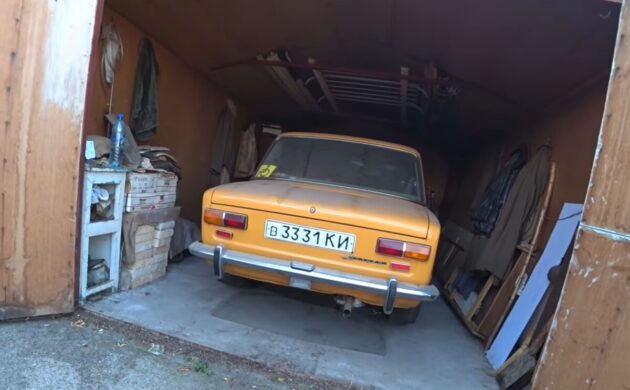
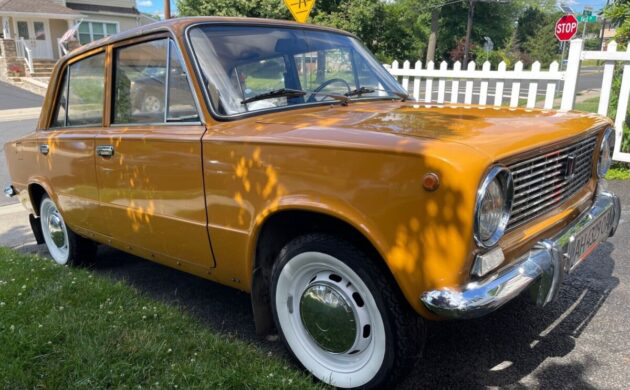
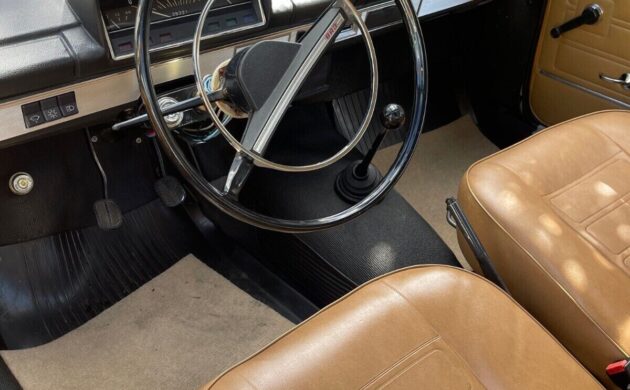
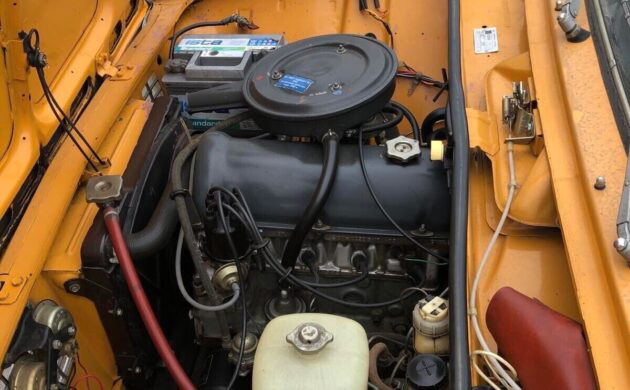
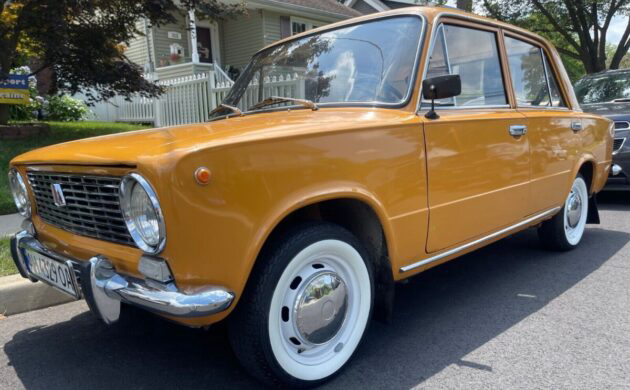





Velcome to Crazy BarnFinds, place of automobiles,,
Looks like the perfect apocalypse car. Roaches, Twinkie, and now Vaz now added to the list of survivors. I like this car simple and rugged. I wonder how long before we tire of modern cars with touchscreens and expensive repairs. Maybe I’m alone in this thought but I don’t know how people afford new cars. I definitely prefer to live at the bottom of the automotive depreciation curve with no car payments and repairing my old junk. I actually have nice old junk that is kept in good condition. You can own a Ferrari and be exclusive but you can also drive 30+ year old cars and be exclusive as well.
Vodka and caviar not included… I like my VAZ shaken, not stirred
You also need to watch YouTube for how horribly these 4-wheeled coffins do in accidents. An old joke: LADAS have 4 door handles because they double as your coffin! These little sedans are a death sentence in a wreck!
Ah, that thread again.
Now let’s discuss how motorcycle riders fare in accidents.
$16g’s for a USSR relic? Talk about Putin’s price hike!
how many of you that seem to know everything about these cars owned one,lots in Canada ,bought a lada for $50,sister in law drove it for 4 years,great heater even in -40 ,never had any trouble ,drove 80 miles a day
I owned a Fiat 124 in South Africa and it was a great little car. I bought it from a friend of mine because he was emigrating to America. Five years later the wife and I went to visit Hershey and on the way stopped over for 4 days with our friends who lived in guess where? Center St. Garwood, NJ! How’s that for coincidence?
Bloody hell! My father went from owning a Jag Mk2 to a Moskvitch to a Lada. A stunning fall from grace I think you’ll agree. But I still have fond memories of the chap.
but i bet he did not spend as much time fixing it as the jag, have had 5 e-types many sedans and the junk xjs,you can never get lost driving an english car ,just turn around and follow. the trail of oil back.
Well, pushing the Mk 2 down the street to bump start it every cold foggy morning was character building stuff for a seven year old lad!
I drove Ladas in China for several years. Number one requirement for any developing country- If you’re going to build a car (or motorcycle) and need a foreign partner pick a car that was reliable first. The Fiat 124 was junk and the Lada even worse. The Riva, at least the ones imported to Mongolia and China were 4 WD small SUVs.
For a motorcycle example, China imported a few British vertical twin motorcycles from England and began producing their version of the same bike. Starting with an unreliable bike it could only get worse. But they also brought in the tooling from the BMW R71 (by way of the USSR) and these bikes, other than their electrics, and worn tooling could be made to be reliable. Again they started with a reliable bike as their base
I know it is fashionable to dump on Russia these days, but just berating them without cause is silly.
Say what you will about these cars, but they are running half a century after they came out of the factory in places where most cars don’t last very long at all.
I have been driven thousands of miles in remote parts of Kazakhstan and ither former Soviet countries and Eastern Russia — in places where the temperature can go below minus 40 and most roads are in poor condition. All you see are these Gigulis, Nevas, Urals, Waz, Gaz, Kamaz, etc. and of course Toyotas and the occasional Sprinter van. In Kazakhistan for some reason you see Audi 5000s too, and in cities you will see BMWs, And Benzes and VWs and various other things, but when you go out to the back of beyond, it’s mostly these little Fiat knockoffs.
They rust if the roads are salted, but most of the roads are not salted — certainly outside the major cities they aren’t. That was their downfall in Britain — the salt ate them up. In their native habitat they don’t have this issue.
They are easy and cheap to repair, cheap to run, and most important they are light and underpowered, so they don’t beat the crap out of themselves on bad roads. There us a lot to be saud for low horsepower and weight when the goung gets rough. Heavy and powerful cars take more of a beating, obviously.
If I was living out in the country in Russia and couldn’t afford a Land Cruiser and didn’t need a truck, I would be looking for one of these, or one of the little Neva jeeps. They have gone for half a century with very basic maintenance — that’s nothing to sneeze at. When they do break you can find parts and someone who can put them in everywhere. No computers required.
They did make a lot of crappy cars — Moskvitches and Volgas e.g. but these little cars are anything but. They are “appropriate engineering”.
Cool car! Agreed the simplicity is great. For short trips anyways. Gotta say though the wide whites look has gotten so damn old…. Some thin white lines and poverty caps would look great on this.
These were known for running rough and Stalin…
wonder if the seller would take a personal Czech.
Cash only, you need to look for someone selling a Skoda to take your Czech.
I bought one for $25.00. Yeah, twenty-five bucks. The same price as a case of beer at the time.
I drove it 4 years and only stopped because my wife despised it. Pretty no, but it got me to CFB Petawawa and back for Battle School in 1993.
The heater would melt granite.
You could not give them away in Canada in the 80s, but it was in its own way a great car.
They are loud and crude, but very reliable and easy to fix yourself.
The price for them now is mind boggling.
By the way, I seem to remember reading in a car magazine that Lada (Cyrillic: Лада) is a Slavic female given name. In Slavic mythology, Lada is the goddess of beauty, love and marriage. Really??????????
A Russian Fiat from New Jersey for $16,000 –
what could go wrong?
Is potato.
Some said an untoward side effect of Fiat-USSR agreement was Italian received in e change Russian steel, of poor quality. This, along with the dry Italian weather, not requiring much care about steel protection, lead to a generation of rust-prone Italian cars. For sure, Polski Fiat had better steel bodies. Blessings +
Russian vaz 2101 is a clone of Fiat 124. But italian Fiat 125 and Polski Fiat 125 are not similar with 124. 125 little bit larger,then 124 and have another rear suspension.
This car from Ukraine,not from Moscow, Russian. At top photo car have old registration plates of Kiyv region(capital of Ukraine). At bottom pictures car have ukranian plates too,but from a nowadays.